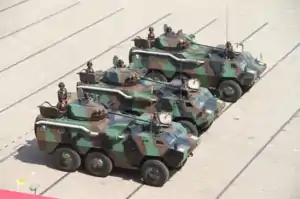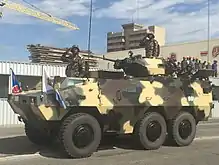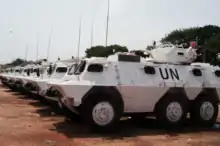| WZ-523 M1984 | |
|---|---|
 WZ-523s of the Ghana Army | |
| Type | Armored personnel carrier |
| Place of origin | People's Republic of China |
| Service history | |
| In service | 1984-Present |
| Used by | See Operators |
| Specifications | |
| Mass | 11,700 kg (25,800 lb) |
| Length | 6.02 m (19 ft 9 in) |
| Width | 2.55 m (8 ft 4 in) |
| Height | 2.73 m (8 ft 11 in) (including machine gun) |
| Crew | 2 + 10 passengers |
| Armor | welded steel
20 mm front 14 mm sides 6 mm rear |
Main armament | 12.7 mm heavy machine gun |
| Engine | Water-cooled petrol engine 123 kilowatts (165 hp) |
| Suspension | Wheeled 6x6 |
Operational range | 600 km (370 mi) |
| Maximum speed | 85 km/h (53 mph) (road speed) 7 km/h (4.3 mph) (water speed) |
The WZ-523 (NATO reporting name M1984) is a six-wheeled Chinese armored personnel carrier designed to be amphibious. Built on the chassis of the Hanyang HY472 truck, it can carry a crew of three and seat up to eight additional passengers. Two primary models were produced—one with a roof-mounted 12.7mm heavy machine gun, and the other with a small turret armed with a 35mm grenade launcher and a 7.62mm co-axial general purpose machine gun. An export model that entered service in 2008 as a fire support vehicle was also marketed successfully to the Namibian Army; this is armed with a 73mm 2A28 Grom smoothbore cannon using the same turret as the Soviet BMP-1 infantry fighting vehicle.[1]
The WZ-523 was unveiled at a military parade in Beijing in October 1984, gaining the NATO designation M1984,[2] although it was destined for export and did not enter large scale service with the People's Liberation Army (PLA).[3] An internal security vehicle based on the WZ-523, the ZFB-91, which has a turret armed with a 35 mm grenade launcher and a 7.62 mm machine gun replacing the roof mounted 12.7 mm anti-aircraft machine gun of the WZ-523, is in service with PLA units in Hong Kong and Macau.[3]
Development and history
The WZ-523 is based on the domestic Dongfeng EQ245 truck platform, with a new chassis. It was developed in parallel with the competing project WZ-551.[4] Due to utilizing old technologies, WZ-523 was developed much faster with initial production starting in 1983. It first appeared on the 35th National Day parade in 1984. However, it WZ-523 chassis eventually lost its bid due to having worse performance than WZ-551.[4][5] WZ-523 project was then refocused for export effort and did not enter large scale service with the People's Liberation Army (PLA).[6][7]
When the WZ-523 was first exhibited publicly, there were many observations by international defence analysts regarding its design origins. Although the hull design resembled that of the South African Sandock-Austral Ratel infantry fighting vehicle, subsequent studies have found that while there may have been some South African influence, the WZ-523 has many unique characteristics in overall dimensions and technical features.[8] For example, its driving compartment is somewhat reminiscent of the BTR-60, with a single passenger seated next to the driver.[8] The location of the turret ring is also similar that of the BTR-60 series rather than the Ratel, being located near the hull center.[8]
The People's Liberation Army has deployed the WZ-523 primarily for reconnaissance purposes, and for specialized tasks involving artillery and combat support units.[9] Despite being designed as an armored personnel carrier, it was not adopted by Chinese mechanized or motorized infantry forces.[9]
Outside of China, Sudan's Military Industry Corporation also produces the WZ-523 under license.[10]
Specifications
WZ-523s have relatively good range and payload, and may seat up to ten passengers who enter and debus from a single door in the rear hull.[8] The vehicle has a long, boat-shaped hull with a trim vane mounted on the glacis plate.[2] It is fully amphibious once this vane is raised, being propelled at speeds of up to 7 km by two water jets at the rear.[8] A two-piece windscreen is provided for the driver and a passenger seated to his right. During combat, the windscreen may be covered by hinged armored shutters.[2]
Export models of the WZ-523 are offered with a variety of turreted armament options, including a 12.7mm machine gun and a one-man conical turret incorporating a single 7.62mm general-purpose machine gun to the right and a heavier armament of the customer's choice to the left.[11]
WZ-523s in Nigerien and Gabonese service have been re-engined with German Deutz BF6 diesel motors.[12]
Variants

- WZ-523
- Armored Personnel Carrier armed with a 12.7 mm heavy machine gun.
- ZFB-91
- Internal Security Vehicle based on the WZ-523.
Operators

 China: 60 in service, not including ZFB91 variant.[13]
China: 60 in service, not including ZFB91 variant.[13] Chad: 10[14]
Chad: 10[14] Ethiopia: 20[12]
Ethiopia: 20[12] Gabon: 3[12]
Gabon: 3[12] Ghana: 58 delivered in 2009–2010;[15] 4 ambulance version delivered in 2012 and 24 others in 2013.[12]
Ghana: 58 delivered in 2009–2010;[15] 4 ambulance version delivered in 2012 and 24 others in 2013.[12] Namibia: 21;[12] export model incorporating the BMP-1 turret.[1]
Namibia: 21;[12] export model incorporating the BMP-1 turret.[1] Niger: 2[12]
Niger: 2[12] Sudan: produced under license as the Shareef 2.[10]
Sudan: produced under license as the Shareef 2.[10]
See also
Vehicles of comparable role, performance, and era
References
- 1 2 "Namiba fields a new Chinese APCs". Archived from the original on 31 October 2014. Retrieved 18 August 2016.
- 1 2 3 Christopher F. Foss (2000). Jane's Tanks and Combat Vehicles Recognition Guide (2000 ed.). Harper Collins Publishers. p. 352. ISBN 978-0-00-472452-2.
- 1 2 "WZ523 Wheeled Armoured Personnel Carrier" Archived 12 February 2013 at the Wayback Machine. Sinodefence.com. 20 February 2009. Retrieved 21 October 2012.
- 1 2 "解放军轮式战车典范-92步战车族及改型". Autohome (in Chinese). 9 September 2012.
- ↑ "卡車心戰車命-簡評ZSL92輪式裝甲車". Taiwan Daily. 22 June 2019.
- ↑ "WZ523 Wheeled Armoured Personnel Carrier". Sinodefence. 20 February 2009. Archived from the original on 12 February 2013. Retrieved 21 October 2012.
- ↑ "NORINCO Type 90 / Type 92 (WZ551)". militaryfactory.
- 1 2 3 4 5 O'Malley, T.J. (1996). Fighting Vehicles: Armoured Personnel Carriers & Infantry Fighting Vehicles. Mechanicsburg: Stackpole Books. pp. 322–342. ISBN 978-1853672118.
- 1 2 Cordesman, Anthony; Kleiber, Martin (1997). Chinese Military Modernization: Force Development and Strategic Capabilities. Washington D.C.: Center For Strategic and International Studies. pp. 93–94. ISBN 978-0-89206-496-0.
- ↑ Jane's Armour and Artillery, 2002, Volume 23 p. 439-440.
- 1 2 3 4 5 6 "Trade Registers". Armstrade.sipri.org. Retrieved 3 December 2014.
- ↑ "China 2004" (PDF). Archived from the original (PDF) on 5 March 2016. Retrieved 3 December 2014.
- ↑ International Institute for Strategic Studies (2021). The Military Balance. p. 457. ISBN 9781032012278.
- ↑ "Ghana Armed Forces" (PDF). Archived from the original (PDF) on 10 May 2018. Retrieved 3 December 2014.
- Foss, Christopher F. Jane's Tanks and Combat Vehicles Recognition Guide. London: HarperCollins, 2002. ISBN 0-00-712759-6.
